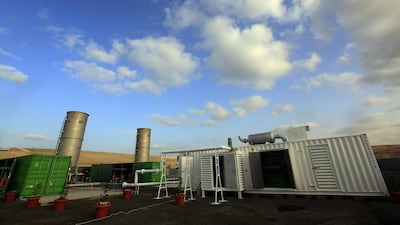The success of a project to tap into the gas generated from a Dubai landfill as a source of alternative energy could soon be replicated elsewhere in the emirate.
Methane gas that seeps from organic waste buried at Al Qusais landfill has been collected for more than a year as part of a successful system developed by Green Energy Solutions & Sustainability (Gess) for Dubai Municipality.
Now the civic body is looking into the possibility of expanding it to the disused Jebel Ali landfill about 50 kilometres away.
“We have now started testing in the Jebel Ali landfill for Dubai Municipality as well,” said Anita Nouri, partner and business development director at Gess.
Work started a few weeks ago with experts assessing the quality and quantity of the gas created from the Jebel Ali site. Results are expected within a month.
Landfills have long been recognised as large emitters of methane – a gas that forms while organic waste rots. The gas is 25 times more harmful to the climate than carbon dioxide (CO2), the most commonly emitted greenhouse gas.
Besides contributing to global warming, landfill gas also presents a missed opportunity – rather than letting it escape into the atmosphere, people should burn it to produce power, said Ms Nouri.
“It is a source of power that has been neglected.”
While it is too early to say whether a system similar to the one already in place in Al Qusais could be set up in Jebel Ali, Ms Nouri said she hoped the success of the first project will help encourage similar initiatives in the UAE and the region.
“This project was a test, sort of. It shows that this is possible,” she said. “Hopefully, it will lead the path to future projects in the region.”
Construction of Al Qusais, the first project of its kind in the region, started in January 2012. Just over a year later the site started to generate power and was officially launched by Dubai Municipality in July last year.
Since then “it has been a smooth operation, we have not had any major issues”, said Ms Nouri, explaining that landfill gas has been plentiful enough to power the company’s and municipality’s offices at the landfill site.
With about 5,000 tonnes of waste – more than half of the emirate’s total – arriving there every day, Al Qusais landfill is one of Dubai’s largest.
To collect methane from the 3.5-square-kilometre site, engineers designed a system combining horizontal and vertical wells. A total of 22km of underground pipes were laid, with the gas collected through 12 chambers situated around the landfill.
Methane is collected under pressure and burnt off in a flare. This results in CO2 emissions, which although contributing to global warming, are less harmful compared to the methane that would be released.
Through the system 6,000 cubic metres of gas per hour are siphoned off from the landfill and burnt. Of this, a small amount is used to run an electric engine with a capacity of one megawatt of electricity. Ultimately, the amount of gas is enough to power a 12MW engine, said Ms Nouri.
Dubai Municipality and the Dubai Electricity and Water Authority are in talks about how this potential could be tapped into, she said.
“To produce electricity is not the issue,” she said. “To be able to put this electricity in the grid and to sell it is the issue. The next stages have to be a green tariff to be able to sell the electricity to the grid.”
A landfill site in Ras Al Khaimah also collects gas. However, this is only burnt and not used to produce electricity.
Collecting landfill gas has been identified as an important step in combating climate change by the United Nations. Through its Clean Development Mechanism (CDM) – a scheme designed to encourage green projects in developing countries – it has been encouraging the creation of similar projects all over the world.
Al Qusais project is registered under the scheme, which means that Green Energy Solutions & Sustainability has received credits for the 300,000 tonnes of greenhouse pollution the project is preventing from escaping into the atmosphere each year.
CDM allows for these credits to be traded – helping provide additional funds for green projects, as well as allowing entities to offset their carbon footprint by purchasing such credits.
Ms Nouri said she hoped the company could trade the credits within the UAE.
“I think it would be great if there could be an internal market for such credits,” she said. “They can be utilised for the benefit of this city, to reduce its carbon footprint.”
vtodorova@thenational.ae

